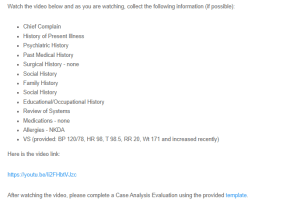SOAP NOTE – Anxiety
Patient Demographic Information:
Patient Initials: J.T.
Age: 35 (assumed based on conversation)
Race: Not mentioned
Marital Status: Married
Employment Status: Works in a bank
Date of Visit: [Insert Date]
Subjective:
Chief Complaint:
“My heart starts to really, really race…I get chest pains. I can’t catch my breath.”
HPI:
For about six months, Julie Thomas has been suffering from palpitations, chest pains, and shortness of breath. The symptoms started during a hot day and when she attempted to get to town. She says these episodes make her feel like her heart is racing and she cannot breathe, and chest pains make her think that she is having a heart attack. This fear has led to high levels of avoidance behaviours; she avoids going out alone, exercising, and having sex because she fears these may worsen her symptoms. Julie continues to experience the above-stated symptoms, though a typical ECG result was obtained from a previous test, and she remains concerned about her heart. She links the onset of her symptoms to increased stress at work, which started around the same time as the symptoms began.
Past Psychiatric History: Julie did not report any history of psychiatric illness before these episodes began. She has not received any prior treatment for psychiatric conditions.
Substance Abuse: Julie denies any history of substance abuse, including tobacco and alcohol.
Review of Systems:
Cardiovascular: Episodes of rapid heart rate and chest pain.
Respiratory: Shortness of breath during episodes.
Psychological: Anxiety centered around fears of heart disease, leading to avoidance behavior.
Current Medication List:
Medications: None.
Drug Allergies: NKDA
Objective Information:
Vital Signs:
Height: Not provided.
Weight: 171 lbs (noted as having increased recently).
Pulse: 98 bpm.
Respiratory Rate: 20 breaths per minute.
Blood Pressure: 120/78 mmHg.
Temperature: 98.5°F.
Physical examination: No comprehensive physical examination was performed. However, a focused assessment revealed no abnormal cardiovascular or respiratory system findings.
MSE:
Appearance: Appropriate for age.
Behaviour: Exhibits anxiety, especially when discussing symptoms.
Mood: Anxious.
Affect: Congruent with mood.
Thought Process: Logical but focused on fears of having a heart attack.
Thought Content: Persistent worry about heart health.
Insight: Partial; acknowledges that anxiety might be contributing to her symptoms but remains fixated on the idea of a heart condition.
Judgment: Intact; seeks medical advice and is open to exploring treatment options.
Perception: No hallucinations or delusions noted.
Assessment
Diagnoses:
- Panic Disorder with Agoraphobia (ICD-10: F41.0)
Rationale: Julie presents with classic symptoms of panic attacks, including sudden onset of rapid heart rate, chest pain, and shortness of breath, often accompanied by fear of having a heart attack. Her avoidance of situations that might trigger these symptoms, such as going out alone, exercising, and engaging in sexual activity, supports a diagnosis of panic disorder with agoraphobia. These symptoms are exacerbated by stress, and despite reassurance from a normal ECG, she continues to fear that something is wrong with her heart. Panic disorder is characterized by recurrent unexpected panic attacks and persistent concern about having more attacks or their consequences (Shin et al., 2020).
-
Generalized Anxiety Disorder (ICD-10: F41.1)
Rationale: While the primary diagnosis is panic disorder, Julie’s pervasive worry about her heart health, avoidance of multiple activities, and the impact on her daily life also suggest a broader anxiety issue. Generalized Anxiety Disorder (GAD) involves excessive anxiety and worry that is difficult to control and affects daily functioning (Munir & Takov, 2022).
Differential Diagnoses:
- Cardiac Arrhythmia (ICD-10: I49.9)
Rationale: Although Julie’s ECG results were expected, ongoing symptoms necessitate continued consideration of a potential cardiac cause, especially given her family history of heart disease. Further cardiac evaluation might be warranted if symptoms persist or worsen (Kingma et al., 2023).
- Hyperthyroidism (ICD-10: E05.90)
Rationale: Symptoms such as palpitations, anxiety, and weight changes can also be indicative of hyperthyroidism. Thyroid function tests could be considered to rule out this condition (Mathew & Rawla, 2023).
References
Kingma, J., Simard, C., & Drolet, B. (2023). Overview of Cardiac Arrhythmias and Treatment Strategies. Pharmaceuticals, 16(6), 844. https://doi.org/10.3390/ph16060844
Mathew, P., & Rawla, P. (2023, March 19). Hyperthyroidism. PubMed; StatPearls Publishing. https://www.ncbi.nlm.nih.gov/books/NBK537053/
Munir, S., & Takov, V. (2022, October 17). Generalized anxiety disorder. National Library of Medicine; StatPearls Publishing. https://www.ncbi.nlm.nih.gov/books/NBK441870/
Shin, J., Park, D.-H., Ryu, S.-H., Ha, J. H., Kim, S. M., & Jeon, H. J. (2020). Clinical implications of agoraphobia in patients with panic disorder. Medicine, 99(30). https://doi.org/10.1097/MD.0000000000021414
ORDER A PLAGIARISM-FREE PAPER HERE
We’ll write everything from scratch
Question 
Watch the video below and as you are watching, collect the following information (if possible):
- Chief Complain

SOAP NOTE – Anxiety
- History of Present Illness
- Psychiatric History
- Past Medical History
- Surgical History – none
- Social History
- Family History
- Social History
- Educational/Occupational History
- Review of Systems
- Medications – none
- Allergies – NKDA
- VS (provided: BP 120/78, HR 98, T 98.5, RR 20, Wt 171 and increased recently)
Here is the video link:
After watching the video, please complete a Case Analysis Evaluation using the provided template.